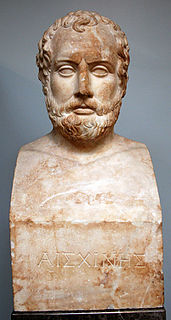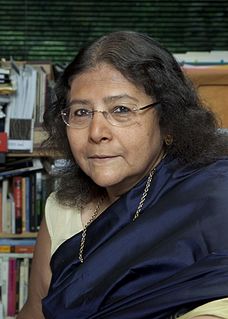A Quote by Aristotle
Democracy appears to be safer and less liable to revolution than oligarchy. For in oligarchies there is the double danger of the oligarchs falling out among themselves and also with the people; but in democracies there is only the danger of a quarrel with the oligarchs. No dissension worth mentioning arises among the people themselves. And we may further remark that a government which is composed of the middle class more nearly approximates to democracy than to oligarchy, and is the safest of the imperfect forms of government.
Related Quotes
There are still two forms besides democracy and oligarchy; one of them is universally recognized and included among the four principal forms of government, which are said to be (1) monarchy, (2) oligarchy, (3) democracy, and (4) the so-called aristocracy or government of the best. But there is also a fifth, which retains the generic name of polity or constitutional government.
They that are discontented under monarchy, call it tyranny; and they that are displeased with aristocracy, call it oligarchy: so also, they which find themselves grieved under a democracy, call it anarchy, which signifies the want of government; and yet I think no man believes, that want of government, is any new kind of government.
The legislator should direct his attention above all to the education of youth; for the neglect of education does harm to the constitution. The citizen should be molded to suit the form of government under which he lives. For each government has a peculiar character which originally formed and which continues to preserve it. The character of democracy creates democracy, and the character of oligarchy creates oligarchy.
It has been observed that a pure democracy if it were practicable would be the most perfect government. Experience has proved that no position is more false than this. The ancient democracies in which the people themselves deliberated never possessed one good feature of government. Their very character was tyranny; their figure deformity.
In the Laws it is maintained that the best constitution is made up of democracy and tyranny, which are either not constitutions at all, or are the worst of all. But they are nearer the truth who combine many forms; for the constitution is better which is made up of more numerous elements. The constitution proposed in the Laws has no element of monarchy at all; it is nothing but oligarchy and democracy, leaning rather to oligarchy.
Disagreement produces debate but dissent produces dissension. Dissent (which come from the Latin, dis and sentire) means originally to feel apart from others. People who disagree have an argument, but people who dissent have a quarrel. People may disagree and both may count themselves in the majority. But a person who dissents is by definition in a minority. A liberal society thrives on disagreement but is killed by dissension. Disagreement is the life blood of democracy, dissension is its cancer.
I am kind of a sucker for democracy, so I do think that what kinds of citizens we have in our societies are more foundational than what kinds of governments we have, and that the responsibility for self-government is ultimately with us. But we also have learned through a couple thousand years of democracy that democracies are only as good as people's capacity to reflect on those questions.
Governments, if they endure, always tend increasingly toward aristocratic forms. No government in history has been known to evade this pattern. And as the aristocracy develops, government tends more and more to act exclusively in the interests of the ruling class -- whether that class be hereditary royalty, oligarchs of financial empires, or entrenched bureaucracy.
Remember, democracy never lasts long. It soon wastes, exhausts, and murders itself. There never was a democracy yet that did not commit suicide. It is in vain to say that democracy is less vain, less proud, less selfish, less ambitious, or less avaricious than aristocracy or monarchy. It is not true, in fact, and nowhere appears in history. Those passions are the same in all men, under all forms of simple government, and when unchecked, produce the same effects of fraud, violence, and cruelty.



































